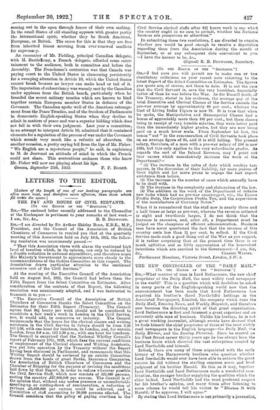[To sus EDITOR OF THY " SPF-CTATOR."] feel sure you
will permit me to make one or two elucidatory criticisms on your recent note referring to the latest Report of the Select Committee on Estimates. The figures you quote are, of course, not those to date. It is not the case that the Civil Servant is, save the very humblest, financially better off than he was before the War. As Sir Russell Scott, *0 the Treasury, stated in his evidence, the average pay of the total Executive and Clerical Classes of the Service exceeds the pre-war average by approximately 60 per cent., whereas the Cost of Living Index Figure is now 79. It is true that when ho spoke, the Manipulative and Messengerial Classes had a bonus of appreciably more than 100 per cent., but these classes being in receipt of very humble salaries, they were better paid than the immediately higher grades, but they are now being paid on a much lower scale. From September 1st last, the bonus " cut " in the remuneration of Civil Servants took place on an average figure of 85, and it is still falling. The present salary, therefore, of a man with a pre-war salary of £80 is now £164, but this only applies to the very subordinate grades. As regards the cost of the Inland Revenue, may I point out four causes which cumulatively increase the work of the Department?—
" (1) The increase in the rates of duty which renders tax- payers, in the discussion of their liability, far more jealous of their rights and far more prone to engage the best expert assistance than before.
(2) The increase in the number of cases which annually have to be dealt with.
(3) The increase in the complexity and elaboration of the law.
(4) The addition in the work of the Department of definite new tasks which had no pre-war counterpart, viz., the Excess Profits Duty, the Corporation Profits Tax,' and the supervision of the manufacture of Currency Notes."
When it is remembered that the staff now is nearly three and a half times as large as pre-war, whereas the revenue collected is eight and two-thirds larger, I do not think that the increase is excessive, and, after all, a Department must be judged on the cheapness of efficient administration. Business men have never questioned the fact that the revenue of this country costs less than n per cent, to collect. If the Civil, Service made such a good thing out of the War as you suggest, it is rather surprising that at the present time there is so much agitation and so little appreciation of the benevolent intentions which are ascribed to the Government.—I am, Sir,


































 Previous page
Previous page